|
Books Should Be Free Loyal Books Free Public Domain Audiobooks & eBook Downloads |
|
|
Books Should Be Free Loyal Books Free Public Domain Audiobooks & eBook Downloads |
|
Myths and Legends |
|---|
|
Book type:
Sort by:
View by:
|
By: Joseph Jacobs | |
|---|---|
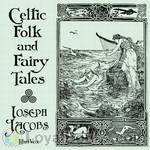 Celtic Folk and Fairy Tales
Celtic Folk and Fairy Tales
Celtic Fairy Tales is a collection of 25 folk and fairy stories collected from Ireland and Scotland. At what I imagine is the Frontispiece, or the dedication page, is the phrase: “SAY THIS Three times, with your eyes shut ‘Mothuighim boladh an Éireannaigh bhinn bhreugaigh faoi m’fhóidín dúthaigh.’And you will see/What you will see_” A loose translation of this Gaelic phrase is “I sense the smell of a sweet, enchanting Irishman around my dear homeplace.” | |
By: Hermann Gunkel | |
|---|---|
 The Legends of Genesis
The Legends of Genesis
The Legends of Genesis is the English translation of the introduction to Gunkel’s massive commentary, Genesis. Gunkel uses form critical analysis on the text of Genesis to determine the various genres of the biblical legends and their significance to the authors. Gunkel also uses form criticism to uncover buried clues as to the constituent sources of the text. Gunkel offers his hypothesis to explain how the various sources came to be combined and redacted, and how the text later came to be attributed to Moses. | |
By: Unknown (43 BC - 18?) | |
|---|---|
 The Metamorphoses of Ovid Vol. I, Books I-VII
The Metamorphoses of Ovid Vol. I, Books I-VII
| |
By: John Cargill Brough (1834-1872) | |
|---|---|
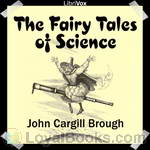 The Fairy Tales of Science
The Fairy Tales of Science
This book, written in the mid 19th century and illustrated by Charles H. Bennett, provides an entertaining introduction to topics in science for children. In each chapter, the author uses a popular myth or fairy tale to lay the groundwork for an equally fascinating "fairy tale of science" full of interesting facts and real life examples. | |
By: Arthur Conan Doyle (1859-1930) | |
|---|---|
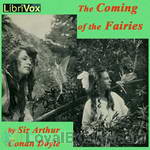 The Coming of the Fairies
The Coming of the Fairies
After a number of deaths in his close family, Sir Arthur Conan Doyle turned to spiritualism in hope of finding proof of the afterlife. Being open in this way, he wanted to believe that spirits and other supernatural being including fairies were real. Because of this he believed the photographs of fairies taken by the Cottingley girls were proof of the existence of such beings. In this book he presents his stance on the issue. Eventually it was proven that the photographs were indeed a hoax. | |
By: Edith Howes (1872-1954) | |
|---|---|
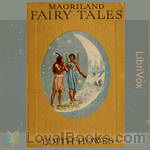 Maoriland Fairy Tales
Maoriland Fairy Tales
Most of the tales have some basis in history. It is an oral language so all histories have to be remembered and retold. To help with this memory retelling the carvings all have relative information and prompts, stories of Atua (sort of gods) and other people (pakeha) that have been encountered are all blended into the stories.One of the amazing things to listen to is a person's whakapapa (family line). My son's father can tell his whakapapa right back to first landing in the canoe Aotea. It takes hours with the stories of battles, moving and resettling and then the invasion of British soldiers and settlers... | |
By: W. O. E. Oesterley (1866-1950) | |
|---|---|
 Immortality and the Unseen World
Immortality and the Unseen World
The full title of this book is Immortality and the Unseen World - A Study in Old Testament Religion. Oesterley describes the beliefs that pre-Christian Hebrews and Semites held regarding the afterlife and the immortal nature of humans. The nature, form and evolution of these beliefs are derived from the Tanakh (Old Testament), comparisons with the beliefs and mythologies of neighboring cultures, and archeological finds. To develop a full study, additional beliefs of these people are also considered, including the beliefs of the constituent parts of humans; demonology, angelology, shades and the Satan; the home of the dead, ancestor worship, necromancy, and burial customs... | |
By: Unknown (495? BC - 406 BC) | |
|---|---|
 Oedipus King of Thebes Translated into English Rhyming Verse with Explanatory Notes
Oedipus King of Thebes Translated into English Rhyming Verse with Explanatory Notes
| |
By: Arthur Machen (1863-1947) | |
|---|---|
 The Angels of Mons
The Angels of Mons
The Angels of Mons is a popular legend about a group of angels who supposedly protected members of the British army in the Battle of Mons at the outset of World War I. The story is fictitious, developed through a combination of a patriotic short story by Arthur Machen, rumours, mass hysteria and urban legend, claimed visions after the battle and also possibly deliberately seeded propaganda. | |
By: Edgar Thurston (1855-1935) | |
|---|---|
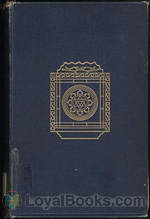 Omens and Superstitions of Southern India
Omens and Superstitions of Southern India
This book deals mainly with some aspects of what may be termed the psychical life of the inhabitants of the Madras Presidency, and the Native States of Travancore and Cochin. | |
By: Francis William Bourdillon (1844-1912) | |
|---|---|
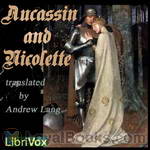 Aucassin and Nicolette.
Aucassin and Nicolette.
Aucassin and Nicolette is a medieval romance written in a combination of prose and verse called a “song-story.” Created probably in the early 13th century by an unknown French author, the work deals with the love between the son of a count and a Saracen slave girl who has been converted to Christianity and adopted by a viscount. Since Aucassin’s father is strongly opposed to their marriage, the two lovers must endure imprisonment, flight, separation in foreign lands, and many other ordeals before their ardent love and fierce determination finally bring them back together... | |
By: George W. Bateman | |
|---|---|
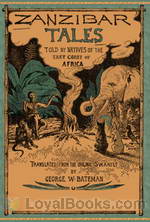 Zanzibar Tales
Zanzibar Tales
If you have read any accounts of adventure in Africa, you will know that travelers never mention animals of any kind that are gifted with the faculty of speech, or gazelles that are overseers for native princes, or hares that eat flesh. No, indeed; only the native-born know of these; and, judging by the immense and rapid strides civilization is making in those parts, it will not be long before such wonderful specimens of zoölogy will be as extinct as the ichthyosaurus, dinornis, and other poor creatures who never dreamed of the awful names that would be applied to them when they were too long dead to show their resentment... | |
By: Unknown (750? BC - 650? BC) | |
|---|---|
 The Odyssey of Homer
The Odyssey of Homer
| |
 The Odyssey Done into English prose
The Odyssey Done into English prose
| |
By: Unknown | |
|---|---|
 National Nursery Book
National Nursery Book
"The Publishers offer in this little volume of well known and long loved stories to their young readers. The tales which have delighted the children of many generations will, they feel assured, be equally welcome in the nurseries of the present day, which, with the popularity and antiquity of the contents of the volume, justify them in styling it The National Nursery Book." Red Riding Hood, The Three Bears, Mother Hubbard, Cinderella and many other well known stories, poems, nursery rhymes and songs are included in this little book. Note that the Punch and Judy story does include a lot of gratuitous violence but then that is what Punch and Judy seem to be all about, eh? | |
By: Unknown (1179?-1241) | |
|---|---|
 The Younger Edda Also called Snorre's Edda, or The Prose Edda
The Younger Edda Also called Snorre's Edda, or The Prose Edda
| |
 The Æneid of Virgil Translated into English Verse by E. Fairfax Taylor
The Æneid of Virgil Translated into English Verse by E. Fairfax Taylor
| |
By: Anonymous | |
|---|---|
 Folk-Lore and Legends Scotland
Folk-Lore and Legends Scotland
| |
By: Unknown (750? BC - 650? BC) | |
|---|---|
 Odysseus, the Hero of Ithaca Adapted from the Third Book of the Primary Schools of Athens, Greece
Odysseus, the Hero of Ithaca Adapted from the Third Book of the Primary Schools of Athens, Greece
| |
By: Aeschylus (c. 525/524-456/455 BC) | |
|---|---|
 Prometheus Bound (Buckley Translation)
Prometheus Bound (Buckley Translation)
"Prometheus Bound" is the only complete tragedy of the Prometheia trilogy, traditionally assumed to be the work of Aeschylus. Jupiter has turned against Prometheus for protecting mankind and has ordered him to be chained to a rock. But Prometheus is comforted by his knowledge of a way to bring about the downfall of Jupiter. | |
By: Virgil (70 BC - 19 BC) | |
|---|---|
 Aeneid, prose translation
Aeneid, prose translation
The Aeneid is the most famous Latin epic poem, written by Virgil in the 1st century BC. The story revolves around the legendary hero Aeneas, a Trojan prince who left behind the ruins of his city and led his fellow citizens to Italy, where he became the ancestor of the Romans. The first six of the poem’s twelve books tell the story of Aeneas’ wanderings from Troy to Italy, while the poem’s second half treats the Trojans’ victorious war upon the Latins. This is the recording of J.W.MacKail's prose translation. | |
By: Various | |
|---|---|
 King's Daughter and Other Stories for Girls
King's Daughter and Other Stories for Girls
A charming collection of short stories for young girls, including The King's Daughter, The Old Brown House, A Story for School Girls, What One Lie Did, Two Ways of Reading the Bible, Courtesy to Strangers, Live for Something, and Jennie Browning. Each story subtly teaches an important lesson. | |
By: Anonymous | |
|---|---|
 The Twelve Labours of Hercules, Son of Jupiter & Alcmena
The Twelve Labours of Hercules, Son of Jupiter & Alcmena
| |
By: Unknown (43 BC - 18?) | |
|---|---|
 The Metamorphoses of Publius Ovidus Naso in English blank verse Vols. I & II
The Metamorphoses of Publius Ovidus Naso in English blank verse Vols. I & II
| |
By: Anonymous | |
|---|---|
 Saga of Gunnlaug the Worm-Tongue and Raven the Skald
Saga of Gunnlaug the Worm-Tongue and Raven the Skald
| |
By: Unknown (480? BC - 406 BC) | |
|---|---|
 The Electra of Euripides Translated into English rhyming verse
The Electra of Euripides Translated into English rhyming verse
| |
 Amphitryon
Amphitryon
| |
By: Anonymous | |
|---|---|
 The Story Of Frithiof The Bold 1875
The Story Of Frithiof The Bold 1875
| |
 Folk-lore and Legends: German
Folk-lore and Legends: German
| |
 The High History of the Holy Graal
The High History of the Holy Graal
| |
By: Unknown (70 BC - 19 BC) | |
|---|---|
 The Æneids of Virgil Done into English Verse
The Æneids of Virgil Done into English Verse
| |
By: Euripides (484 BC - 406 BC) | |
|---|---|
 Alcestis
Alcestis
Alcestis is the earliest surviving play by Euripides. Alcestis, the devoted wife of King Admetus, has agreed to die in his place, and at the beginning of the play she is close to death. In the first scene, Apollo argues with Thanatos (Death), asking to prolong Alcestis' life, but Thanatos refuses. Apollo leaves, but suggests that a man will come to Pherae who will save Alcestis. Euripides' play is perhaps the most unusual Greek drama ever written: a tragedy that is not a tragedy. | |